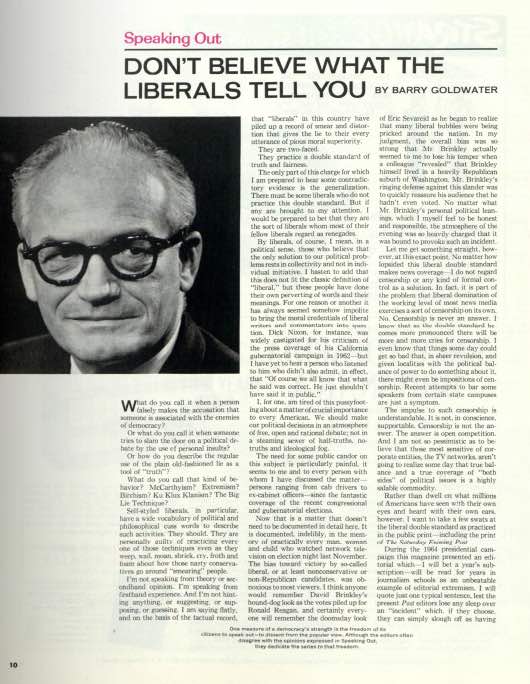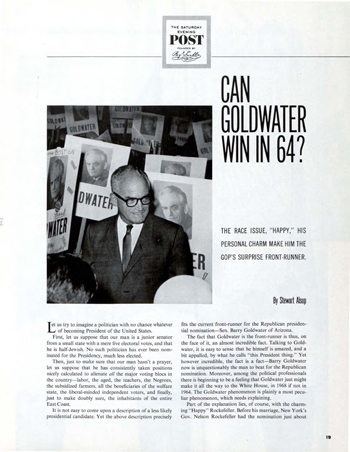Trump and Goldwater: Same Message, Different Outcome
Brash, opinionated, and promising to overturn the political status quo, Donald Trump surprised many Americans who’d never seen a presidential candidate like him. Many people looked for a precedent for him in our history. Some compared him to Andrew Jackson, but he may be more like the man who wrote the editorial below.
Arizona senator Barry Goldwater was the Republican presidential nominee in 1964, running against Lyndon B. Johnson. Like Trump, Goldwater promoted dramatic solutions to the country’s problems. Both portrayed the federal government as the enemy of liberty. Neither man openly espoused racist policies, but both were lauded by overtly racist organizations. Both played to the media with startling rhetoric that challenged the political establishment. And both criticized the media for how their campaigns were covered.
The 1964 Democrats, led by Johnson, had little problem portraying Goldwater as a wild extremist who couldn’t be trusted to maintain peace with the Soviet Union or to promote the civil rights of Americans. Goldwater lost heavily, receiving 27 million votes compared with President Johnson’s 43 million.
In this article from the February 11, 1967, issue of the Post, which Goldwater wrote three years after losing the election, he struck back at “liberals”— i.e., reporters — who he claimed, with some fairness, had been extremely critical of him.
He cited a groundless CBS report that hinted he was playing up to a reviving fascist party in Germany. The San Francisco Examiner, he added, claimed he wanted to shut down Social Security. Even the Post received its fair share of criticism. He quoted an anti-Goldwater editorial from 1964 that called the candidate “a wild man, a stray, an unprincipled and ruthless political jujitsu artist.”
Obviously, things turned out very differently for Trump than they did for Goldwater. Much has changed in 50 years, but Goldwater’s screed reveals that the media and “fake news” have long been the target of diatribes, even if the criticisms have since shrunk to 140 characters.

Featured image: Barry Goldwater (Ollie Atkins for The Saturday Evening Post) and Donald Trump (Shutterstock)
Campaign Gaffes

Nobody said it was easy being a presidential candidate. You’re never more than just one misstatement away from putting your entire campaign at risk. A quick look through the record books reveals that Mitt Romney’s “47 percent” comment is rivaled by quite a few bloopers uttered by presidential candidates in modern times.
One of them was Romney’s father, George, who was campaigning for the Republican nomination in 1968. In a TV interview, he said he had been lured into supporting the Vietnam War because he “had the greatest brainwashing that anybody can get when they go over to Vietnam.” The press latched onto the “b” word and that was the end of his presidential run.
But years earlier, in 1963, candidate Barry Goldwater made a horrific blunder during an interview with The Saturday Evening Post when he candidly announced, “Sometimes I think this country would be better off if we could just saw off the Eastern Seaboard and let it float out to sea.”
Lyndon Johnson’s campaign team pounced, producing a TV ad released August 31, 1963, that showed a saw cutting through the states from Ohio to Florida.
Here’s an excerpt from the Post story, which ran in the August 24 issue:
The era when the South and West were semicolonial dependencies of New York-dominated capital is over, but in these areas “the East” is still regarded with a mixture of suspicion, dislike and envy. Goldwater perfectly expresses this attitude—to an extent hardly recognized in the East, he is the anti-Eastern candidate. He once remarked—perhaps only half jokingly—that the East Coast ought to be “sliced off and set adrift.”
Click here to read the full article: “Can Goldwater Win in 64?”
POST script: In the interest of fairness, it’s not just Republicans who shoot their mouths off and pay the price. There’s John Kerry’s infamous, “I actually did vote for the $87 billion, before I voted against it;” Howard Dean’s Victory Scream; and, of course, the endlessly spoofed, “I took the initiative in creating the Internet,” by Al Gore.